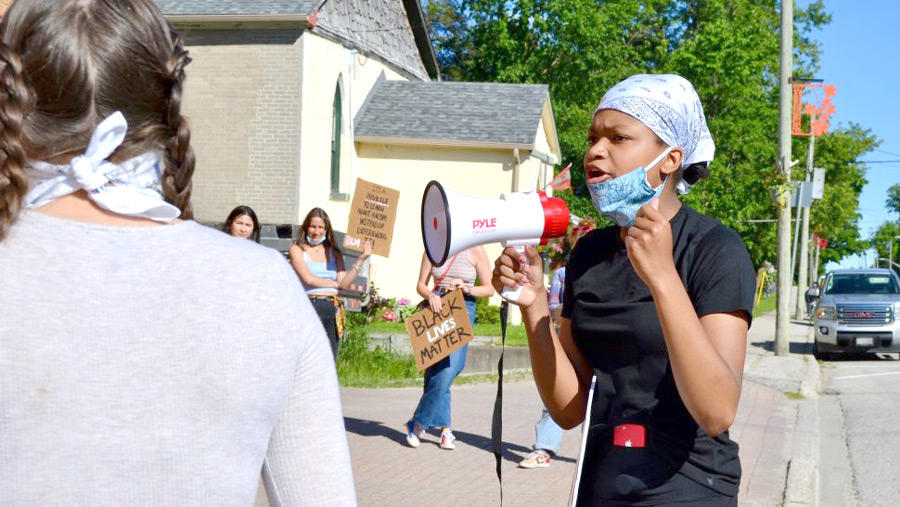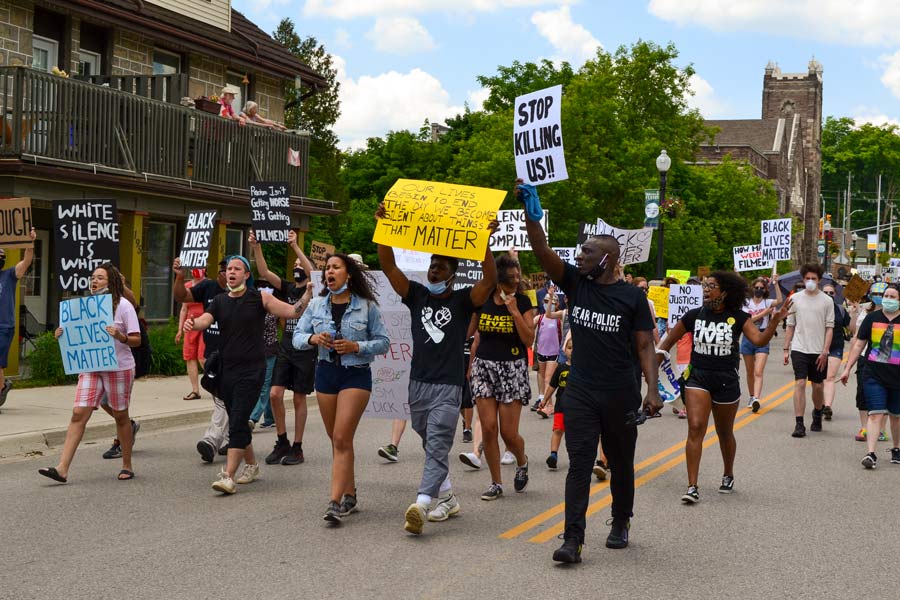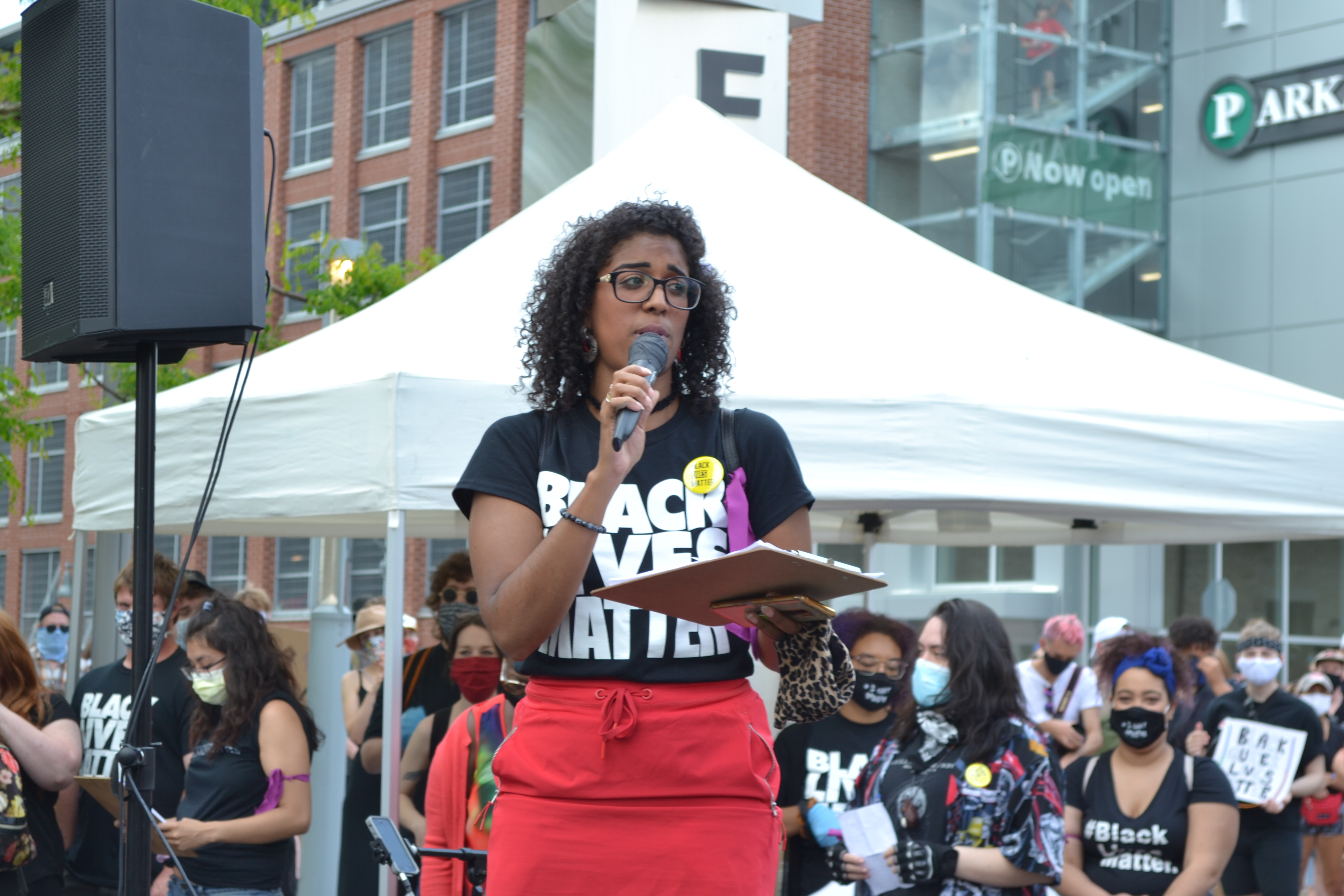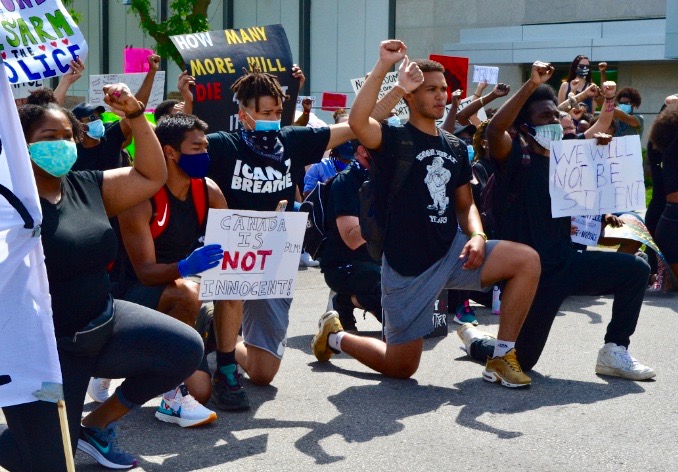WELLINGTON COUNTY – The organizers of last year’s Black Lives Matter (BLM) protests in Wellington County say the events sparked a movement for actionable change and built a foundation for unity within the community.
“I realized how many people actually care, because it’s hard to see how many people care when you’re alone, when you’re the only one,” said Kyra Nankivell, one of the organizers of the Fergus protest last June.
“But when you see all these people marching together for one purpose and one mission, it’s very powerful.”
Prompted by the murders of unarmed Black men and women in America, such as Ahmaud Arbery, George Floyd, Elijah McClain and many others, the protests put police brutality and institutionalized racism on centre stage in 2020.
The new year has ushered in resources and petitions for education, spaces and events that uplift the Black community.
The success of these protests inspired organizers from Erin, Fergus and Guelph to create safe spaces for Black youth in their communities.
“Young children of colour should not have to be teaching grown adults the way to integrate education that benefits all students,” said Ashanti Mesha Morgan, co-organizer of the Erin protest on June 13.
“I shouldn’t have to tell you why Black history is important.”
Erin protest
Morgan and fellow Erin organizer Oliver Beckingham got involved because they wanted to make a change in their hometown.
Inspired by her older sister’s commitment to advocating for social change throughout high school, Morgan set out on her own mission to create positive change in her community.
Beckingham similarly was inspired by his mother, who has an active presence in her community and has overcome challenges as a single mother, breaking barriers and uplifting others along the way.
But the BLM protests themselves were not without their challenges, including some motorists shouting obscenities – or worse.
“There was one guy at our first protest flying the confederate flag, and then a guy who confronted us and said ‘All lives matter’,” said Beckingham.
“We let them unlearn in that moment that yes, all lives matter, but we want to focus on the ones who are struggling right now.”

Ashanti Mesha Morgan speaks to those who gathered for the Black Lives Matter march on June 13 in Hillsburgh.
Morgan and Beckingham, say the majority of the community was overwhelmingly supportive, shouting words of encouragement from their balconies and joining the protest, with Erin Mayor Allan Alls signalling a thumbs up.
The attitude that surrounded the Black Lives Matter Protest in the town of Erin was one of hope and empowerment, Morgan said.
Beckingham and Morgan say they are working with Erin District High School to promote Black history and culture, including clubs, assemblies and bulletins that promote diversity and inclusion while exploring and discussing Black issues.
Both Morgan and Beckingham say standing up against racism and injustice are the keys to a brighter future.
“When everyone goes home and when the lights go out when you are faced with oppression, racism, or the wrong in others’ actions, will you say something or will you conform?” Morgan wondered aloud.
“Continue to stand up even though it’s a hard task – your voice is powerful enough to do that.’’
Fergus event
The BLM protest in Fergus on June 20, led by Nankivell, Maddie Smith and Erick Baptiste, garnered a large show of support from the Centre Wellington community.
“I think it came at a time where tensions were escalating in America and there were some unbelievable tragedies and loss of life that occurred,” Nankivell told the Advertiser.
“As a Black community we can’t stand silent. We need to come together and let our voices be heard, especially in Centre Wellington, where it’s a predominantly white population.”
The Fergus protest was also not without its difficulties, including rude motorists, the potential for counter-protests, negative attention and emotional fatigue.
Nankivell, who was 19 when she was organizing the Black Lives Matter Protest in Fergus, said she felt responsible for the safety of everyone who attended, but for her the emotional weight of these protests extended far beyond participant safety.

At least 500 people attended the Black Lives Matter march in Fergus on June 20. Advertiser file photo
She said many felt a strong connection to the message of justice associated with Black Lives Matter, not just in the call for police reform but in the ancestral and historical connection to revolution and freedom.
Also participants in a Kitchener-Waterloo protest, Nankivell and Baptiste felt an overwhelming connection of shared pain and trauma of those within the African diaspora.
“I remember as we were marching around Erick took the megaphone from someone and he just started screaming “no justice, no peace!” And as his significant other looking up at him, I could see there was so much built-up pain, and it all came out through his words,” said Nankivell.
“You could hear his heart in everything he said, and he literally yelled in that microphone until he started tasting blood. I remember him looking at me and saying, ‘I feel like I have the weight of my ancestors on my back.’”
Nankivell said a lot of work remains when it comes to racial equality.
“I think Centre Wellington is going to have a growing minority population in the future and for years to come. Whether they want to accept that or not, the people here are going to need to understand and have empathy for minority communities, which they might not have previously been interacting with,” said Nankivell
“I think that a lot of work is going to have to come from a grassroots level … It’s up to the community to include minority cultures in their fairs, celebrations and events.”
Guelph protest
Kayla “Kween” Gerber, executive director of the Guelph Black Heritage Society (GBHS), led one of the largest Black Lives Matter Protests in the region.
“We see kids out there protesting for their family’s lives; that isn’t something we should have to see, or witness or have our kids do,” said Gerber.
“And that’s the change we want to make … so we don’t have to do these protests anymore.”
She said the Guelph Black Lives Matter Protest was an empowering event for BIPOC (Black, Indigenous and People of Colour), creating a platform for Black voices, inspiring community leaders to petition for the reallocation of police funding, create community lead programming, and build Black education campaigns and resources.

Kayla “Kween” Gerber was one of the speakers at the Black Lives Matter protest/march at city hall in Guelph on June 6. Advertiser file photo
The GBHS transition to Black “Heritage” Month in Guelph and Wellington County is one of those resources that changes the narrative to celebrating Black excellence and initiatives that work towards combating anti-Black racism.
“It’s so necessary for us to see representation, to know that we’re loved, to see positive versions of us in every scope and facet of life,” said Gerber.
She added, “I think that that was just as important as raising the awareness on mass incarceration, police violence, loss of BIPOC lives … I wanted to make that change and amplify those voices.”
Each organizer from Centre Wellington, Guelph and Erin said they felt that their communities were growing, expanding and changing – though there is still work to be done.
Whether in schools, local government or the police force, the importance of recognizing and understanding the cultures, beliefs and histories of minority groups is essential in creating inclusive and welcoming communities, they say.




